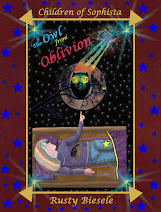Dare to dream of a
world where your essence is the start of an adventure—your very core serves
those around you and those around you appreciate and love who you truly are.
Visualize technology derived from your life itself—technology which forms itself
to serve your needs—technology that does not shape your mind but is shaped by
it. Add to that a computer which watches over you with parental-like concern
and can materialize into existence any form you can visualize. Your imagination
is the tour guide of your mind. You are imagining a world seventy-three light
years away. You are imagining Sophista. It’s because you are a Child of
Sophista.
The Saeshell Book ofTime is indeed a live book. Much of the human mind is a giant pattern matching
neural net. When it cannot find a pattern for a new situation it has
encountered, it must build a net that matches the pattern of the new data.
Frequently, there is not enough data to create the pattern. Rather than
freezing like a panicked squirrel, it uses a unique device to prevent this—it
uses “imagination” to fabricate data and finish the pattern.
The Saeshell Book ofTime is unique in that it exploits this aspect of the human mind; by refusing
to complete a pattern essential to the story it forces the reader to complete
it themselves. It is a function the human mind must perform compulsively. Quite
simply, the book is alive because it is made from you—made from your own mind.
By each reader completing the pattern, each reader creates a unique experience
for themselves. What each reader thinks and says about the book is a reflection
of who they are. I deliberately implemented this structure in the book to force
my target gifted teen audience to argue about the book and what it means or
what its philosophical implications are. Every reader comes away with a
different concept of the book created by differing mental prejudices they brought
with them.
The biggest piece of
technology a gifted teen possesses is their own mind—technology or a tool
derived from their life itself. Thinking of it as tool allows much greater
control of it—and the story shows situations where the tool becomes unruly. It
also shows that these episodes of unruliness are not causes for disaster, but
moments of learning and exposé of deeper aspects of the tool that they were
unaware of.
One of the mischievous
pranks I played in the book was to obscure what was science fiction and science
fact. Many times, what appears to be science fiction is actually science fact.
A good fantasy keeps you guessing so that you are forced to imagine the whole serial
as reality. In that vein, Tova is the actual composition of a number of real people.
I remember while writing her characterization coming across a story of a high
school person in Silicon Valley where I live, who discovered that their father
was suffering from a genetic disease. She was able to get her father’s genome
sequenced and using an Excel spreadsheet, and after six months, locate the
defective genetic sequence. She, along with other researchers, was able to
write a paper describing the mechanism of a disease previously not
understood. There are a number of Tovas
in the world. My hope in writing the fictionalized characters of the serial is
to provide a metaphor with which gifted teens can take comfort and feel
acceptance.
The school in the
book is based on the slight extension of an existing Silicon Valley school, the
advanced mathematics program used in the book a small extension of symbolic
manipulation programs currently used in mathematics, the basis for the advanced
life form’s mind based on an extension of a paper from Cambridge Neuroscience…
There are many people today, hidden from the public eye, with breathtaking
talents. Like the Children of Sophista, they feel that they would not be well
received by the public.
In some sense, I hope
that not only will gifted teens take comfort in the book but that everyone will
stretch their imaginations as to what is possible and realize, in an
approximate, metaphoric way, the passions and thoughts that drive the gifted
among us. And whether or not you sympathize with the metaphoric connection the book has to giftedness, I hope you enjoy this multi-volume saga for its unique perspective it brings with the merging of science fiction and fantasy.










